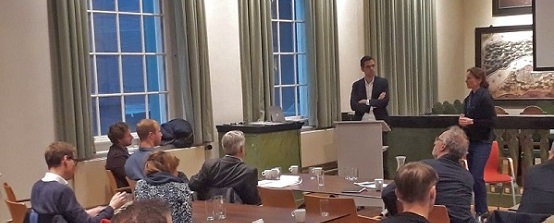Report of the workshop on Higher Education Governance
October 10th 2019 saw the workshop ‘Higher Education Governance in Historical Perspective’, coorganized by the Stevin Centre and the Vossius Centre. This event brought together historians, educational scientists, governance experts, policy makers, and others working in the field of higher education.

Five talks offered different viewpoints on higher education governance models. The implementation of the Act Modernization University Governance Organization (MUB, 1997) at the University of Amsterdam (UvA) functioned as starting point for the contributions.
During the workshop, topics covering new public management driven governance models, the historical background and consequences of changing governance structures in higher education institutions, and the popularization of management in the public sector were discussed. In the following text we summarized some of the outcomes of the workshop.
Stakeholder involvement in university governance
One of the discussed questions was about the underpinning ideals of the current governance model of Dutch universities, as regulated by the Act ‘Modernisering Universitaire Bestuursorganisatie’ (or ‘MUB). Floris van Berckel Smit presented findings from his analysis of the University of Amsterdam’s journal Folia (1995 to 1999), showing a strong involvement of stakeholders in the University’s governance. Subsequently, during his presentation, Sicco de Knecht demonstrated how this had led to various conflicts over time and the termination of a planned merger between the Faculties of Science of the Vrije Universiteit Amsterdam (VU) and the UvA in 2013. Participants argued that the UvA case is exceptional for Dutch universities due to the strong culture of anarchy which supports a continuous active involvement of students and academic staff in the universities’ democratic processes. Therefore, Van Berckel Smit concluded that how governance models are interpreted and enacted varies according to context.


The introduction of business oriented governance models
The session also discussed the wider transformation of the governance of universities in the period of the introduction of the ‘MUB’ Act. Cor van Montfort and Ronald Kroeze talked about how, towards the end of the twentieth century, business oriented governance models were implemented in the Dutch public sector in general. In many cases, (semi)public organizations implemented the so-called two-tier governance model. A critical point made by contributor Cor van Montfort, was that in the implementation of business oriented governance models in higher education, an important stakeholder was missing in the governance model: the shareholder. Van Montfort suggested that in discussing the two-tier governance model, we need to address the missing third party in higher education institutions.
Taken together, the contributions resulted in a series of dynamic discussions where different issues in relation to higher education governance were raised. A variety of perspectives on the issues resulted in a breeding ground for further research, in which the historical and social science perspective could be complementary and strengthen each other. Moreover, the topic seems to have both academic and societal relevance, given the ongoing debate on how to govern and control higher education and the use and misuse of it in the past.
Contributors:
Floris van Berckel Smit
Ab Flipse
Frans de Vijlder
Sicco de Knecht
Cor van Montfort
Melanie Ehren
Ronald Kroeze
The workshop ‘Higher Education Governance in Historical Perspective’ was part of a research project by Floris van Berckel Smit and Ab Flipse on the transformation of governance at the UvA, funded by the Vossius Fund for the History of the University of Amsterdam. The workshop was co-organized by the Vossius Center for the History of Humanities and Sciences (UvA) and the Stevin Centre for History of Science and Humanities (VU).

